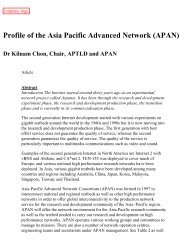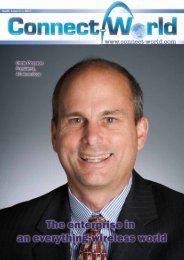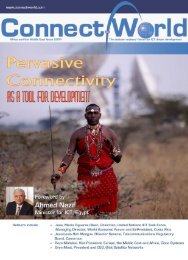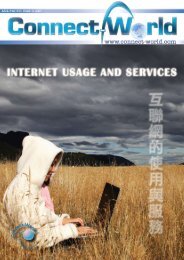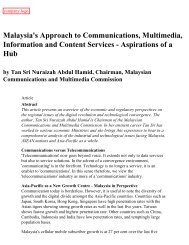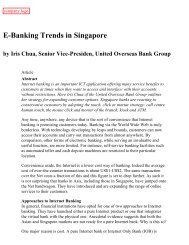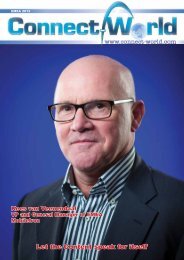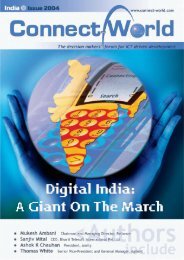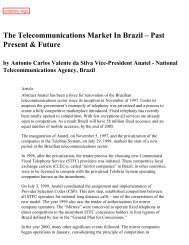Authors include: - Connect-World
Authors include: - Connect-World
Authors include: - Connect-World
You also want an ePaper? Increase the reach of your titles
YUMPU automatically turns print PDFs into web optimized ePapers that Google loves.
National Development<br />
Regulating for growth in Germany<br />
by Matthias Kurth, President, the Regulatory Authority for Telecommunications and Posts,<br />
Germany<br />
Marketplayersbringservicesandnewapplicationsforcustomers.IPtechnologyandthe<br />
introductionofnextgenerationnetworksofferthemhugepotentialinthisregard,but<br />
onlyforuserswithbroadbandconnections.ThespreadofIP-basedbroadbandnetworks<br />
requirestheoversightandsupportofregulatoryauthoritiestomakenewservicessecure<br />
andavailabletoaswideacustomerbaseaspossiblethroughcompetition.Guaranteeing<br />
competitiveaccesstothecostlylastmileinfrastructureiscriticaltothegrowthofhealthy<br />
competition.<br />
MatthiasKurthisthePresidentofGermany’sRegulatoryAuthorityforTelecommunicationsandPosts,<br />
having previously been its Vice President. During his career, he has been Director of Business<br />
Development,LawandRegulationforCOLTTelekomGmbH,ChairmanoftheConferenceofHeadsof<br />
AdministrationoftheMinistersofEconomics,atfederalandstatelevelandMemberoftheSupervisory<br />
BoardoftheDeutscheAusgleichsbank.MrKurthhasalsobeenRepresentativeoftheStateofHessein<br />
the Committee of the Regions of the European Union, Representative of the State of Hesse in the<br />
Regulatory Council for Posts and Telecommunications, State Secretary in the Hesse Ministry of<br />
Economics,TransportandUrbanandRegionalDevelopment,HeadofAdministrationandPermanent<br />
DeputyoftheMinister,ParliamentarySecretaryandDeputyChairmanoftheSPDGroupintheLand<br />
Parliament, member of the Presidium of the Hesse Land Parliament and judge at the Darmstadt<br />
RegionalCourt.<br />
MathiasKurthstudiedLawandEconomicsatFrankfurtamMainUniversity,andwasapostgraduate<br />
legaltraineeintheAdministrationofJusticeoftheStateofHesse.<br />
InternetProtocolandnext<br />
generationnetworks<br />
TheInternetasaninformationmediumhasalreadyrevolutionisedsociety<br />
around the world and opened up<br />
entirely new markets and business<br />
models. This trend is by no means<br />
over. The Internet Protocol and next<br />
generation networks will transform<br />
the telecommunications and media<br />
landscape.Someseethisprocessasa<br />
revolution, while others consider it<br />
more evolutionary. Yet more crucial,<br />
is that it will happen and is unstoppable,nationallyandinternationally.<br />
Thisdynamicwillre-energizecompetition.<br />
It is important now that the<br />
competitive structures that emerged<br />
fromthetraditionalline-switchednetworksarenotstymiedor,worse,eliminated<br />
because of IP technology. All<br />
competitors, without exception, must<br />
take up the challenge of structural<br />
change. Yet it is also important to<br />
makesurethatcompanieswithsignificant<br />
market power do not deploy<br />
technologies that limit other companies'accessorcompetitiveopportuni-<br />
ties. Network and services interoperability<br />
is the crucial issue facing the<br />
markets.<br />
Itisatthispointthatregulationkicks<br />
in. The job of the regulatory authoritiesistoshapetheregulatoryenvironmentinsuchawaythatcompetitionis<br />
notdistortedandinvestmentissecured<br />
evenattimesoftechnologicalchange.<br />
Regulation must therefore focus on<br />
the real bottlenecks. Access to networksandnetworkelements,thelast<br />
mile, is most critical in the end customer<br />
area. The last mile cannot be<br />
replicated without great cost. Access<br />
toitisthereforerestrictedtoexclude<br />
competitors from essential facilities<br />
or, at least, to delay their provision.<br />
Non-discriminatory provision of<br />
scarceresourcessuchasnumbersand<br />
radiospectrummustalsobesecured.<br />
Thejobofthemarketplayersistofurther<br />
develop services and devise new<br />
applications for the customers. The<br />
conversion to IP technology and the<br />
introduction of next generation networks<br />
offer huge potential in this<br />
regard. Network intelligence, today<br />
still located in the network itself, is<br />
shiftingmoreandmoretotheterminal<br />
equipment, in other words closer<br />
to the user. Ultimately, users will be<br />
able to decide for themselves what<br />
servicestouse,andwillpossiblyconfigure<br />
their own or use the services<br />
offeredfromoneormoreproviderson<br />
oneormoreplatforms.<br />
Theoretically, then, the network is<br />
simplifying as the service offer<br />
expands,creatingsynergiesintheprovisionofnetworkcapacitywhileopening<br />
up diverse service offers for the<br />
users. The benefits for users and<br />
henceforfurthergrowthareclear.<br />
Nevertheless, there are risks. New<br />
services and technologies create new<br />
potentialforfraudandnegativeinfluences.Already,thedamagecausedby<br />
spam, phishing, unlawful diallers,<br />
Trojan horses, worms and viruses in<br />
Europe alone is estimated to reach<br />
severalbillioneurosannuallyandthe<br />
trendisupwards.<br />
Such activities have already deterred<br />
many from using services such as<br />
home banking, online shopping and<br />
6



